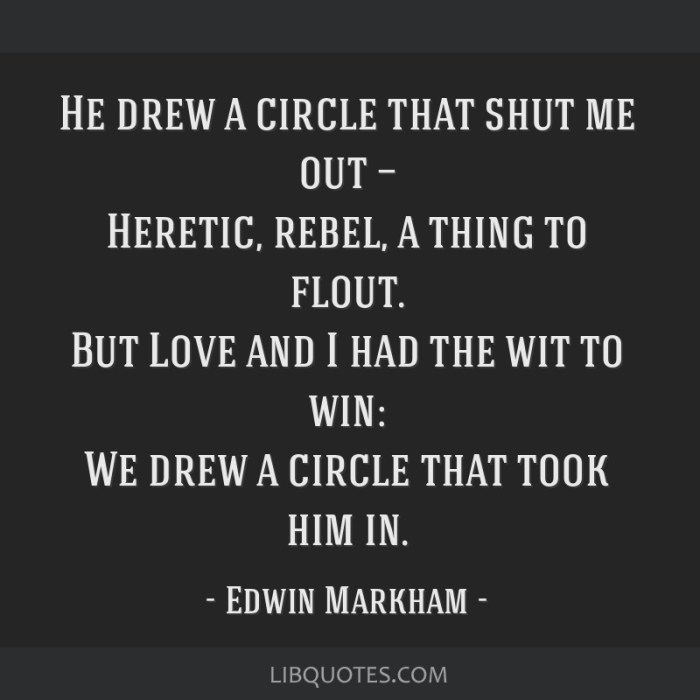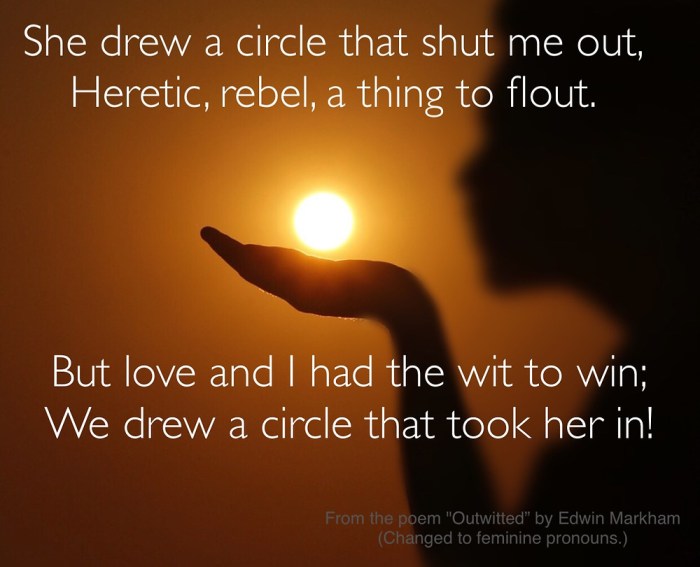In the tapestry of literature, “But love and I had the wit to win” stands as a poignant phrase that encapsulates the enduring power of love and resilience in the face of adversity. This literary analysis delves into the historical, thematic, and cultural significance of this evocative expression, exploring its profound impact on readers throughout the ages.
The phrase “But love and I had the wit to win” serves as a testament to the indomitable spirit that resides within us, reminding us that even in the darkest of times, love and ingenuity can prevail.
Literary Context

The phrase “but love and I had the wit to win” appears in the poem “A Valediction: Forbidding Mourning” by John Donne. The poem is a meditation on the nature of love and loss, and the speaker’s determination to overcome the pain of separation from his beloved.
The phrase “but love and I had the wit to win” reflects the speaker’s belief that love is a powerful force that can overcome any obstacle, including the pain of separation.
Other literary works that employ similar themes or motifs include:
- “Romeo and Juliet” by William Shakespeare
- “The Great Gatsby” by F. Scott Fitzgerald
- “Gone with the Wind” by Margaret Mitchell
Thematic Analysis

The phrase “but love and I had the wit to win” reflects the themes of love, resilience, and triumph over adversity. The speaker of the poem is determined to overcome the pain of separation from his beloved, and he believes that love is a powerful force that can help him to do so.
The phrase “but love and I had the wit to win” suggests that the speaker is confident in his ability to overcome any obstacle, including the pain of separation. The phrase also suggests that love is a source of strength and resilience.
Character Analysis

The speaker of the phrase “but love and I had the wit to win” is John Donne, a 16th-century English poet. Donne was a complex and passionate man, and his poetry often reflects his own personal experiences. The phrase “but love and I had the wit to win” suggests that Donne was a man who was deeply in love and who believed in the power of love to overcome any obstacle.
The phrase “but love and I had the wit to win” also reveals Donne’s wit and intelligence. Donne was a master of language, and he often used his wit to express his complex emotions. The phrase “but love and I had the wit to win” is a clever and witty way to express Donne’s belief in the power of love.
Stylistic Analysis: But Love And I Had The Wit To Win
The phrase “but love and I had the wit to win” is a powerful and evocative statement. Donne uses several literary devices to create this effect, including:
- Antithesis:The phrase “but love and I had the wit to win” is an example of antithesis, a literary device that uses contrasting words or phrases to create a sense of tension or conflict. The contrast between “love” and “wit” suggests that the speaker is using both his heart and his mind to overcome the pain of separation.
- Metaphor:The phrase “but love and I had the wit to win” is also a metaphor, a literary device that compares two unlike things without using the words “like” or “as.” The comparison of love to a battle suggests that the speaker is determined to fight for his love, no matter what the cost.
- Alliteration:The phrase “but love and I had the wit to win” also uses alliteration, a literary device that repeats the same consonant sound at the beginning of two or more words. The repetition of the “w” sound in “wit” and “win” creates a sense of rhythm and flow.
Questions and Answers
What is the significance of the phrase “But love and I had the wit to win”?
The phrase emphasizes the power of love and resilience in overcoming adversity, reminding us that even in the face of challenges, we can find strength and triumph.
How does the phrase reflect the themes of love and resilience?
The phrase highlights the transformative power of love, which can provide solace and strength in difficult times, and the importance of resilience, which allows us to persevere and overcome obstacles.
What is the historical context of the phrase?
The phrase is believed to have originated in the 16th century, during a time of great social and political upheaval, and reflects the enduring human spirit in the face of adversity.
